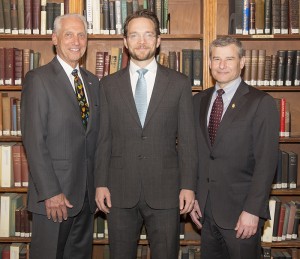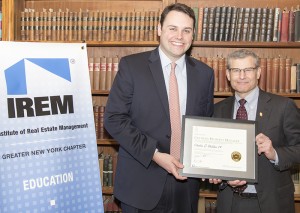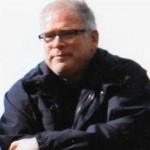
Hoeppner of GK Training addresses IREM at breakfast event; Slicklen of Related management sworn in as CPM
 Shown (from left) are: IREM Industry Partner Richard Silver, president, American Pipe & Tank; Michael Chad Hoeppner; and IREM president Paul Gottsegen, CPM. Photo credit: Van Stolatis.
Shown (from left) are: IREM Industry Partner Richard Silver, president, American Pipe & Tank; Michael Chad Hoeppner; and IREM president Paul Gottsegen, CPM. Photo credit: Van Stolatis.New York, NY The Greater New York chapter of IREM’s February breakfast featured keynote speaker Michael Chad Hoeppner of GK Training and Communications, who led a lecture that taught simple, actionable, and repeatable techniques to come across better in any communication situation. Commented Hoeppner,
“Spoken communication is a physical art. We often hear the phrase, ‘I couldn’t think of what to say.’ But being at a loss for words in communication situations has much more to do with what your breath and body are doing than what your mind is (or is not) thinking,” said Hoeppner.
The chapter also welcomed a new Certified Property Manager (CPM) to their organization. Charles Slicklen, IV of Related Management completed his education requirements, passed the examination and was sworn in at the February breakfast meeting.
The chapter’s next event, “Recovering from a Radiological Attack,” will be a luncheon meeting featuring keynote speaker Dr. Andrew Karam, NYPD counterterrorism division. The event will be held on April 27th from 11:30 a.m. to 1:30 p.m. at The Union League Club, 38 East 37th St. The price is $85 for members and $125 for non-members. A networking cocktail hour will be sponsored by Rosenwach Tank. Jacket is required.
 Shown (from left) are: Charles Slicklen, IV, and IREM president Paul Gottsegen. Photo credit: Van Stolatis.
Shown (from left) are: Charles Slicklen, IV, and IREM president Paul Gottsegen. Photo credit: Van Stolatis.There has been a great deal of talk about the possibility that a terrorist group might use radioactive materials to launch a “dirty bomb” attack. Actually, this talk isn’t all that new – we’ve been worried about this possibility for over a decade now and, even though we haven’t seen such an attack yet, we should still be prepared.
Radioactivity is frightening to most people and, in addition to the immediate health concerns, there are longer-lasting concerns as well: Will exposure to radiation or radioactivity hurt me and my family in the years to come? How long will it be until we can move back home (or re-open our place of business)? What cleanup standards do we have to meet? How much will this all cost? And much more.
While some of these questions don’t yet have hard-and-fast answers, many of them do. And we know enough about radiological remediations that we can guess at a number of answers as well. In this talk we’ll briefly discuss the short-term impact of a radiological attack, but we’ll spend more time talking about some of the practical matters involved with getting New York City – and individual areas within NYC – up and running again in the aftermath of a radiological attack. We’ll answer the questions that we can, and will try to figure out how to approach the rest.
About the speaker: Andrew Karam is a radiation safety professional with 35 years’ of experience in his profession, beginning with the eight years he spent in Naval nuclear power. During his career Dr. Karam has worked for state and local governments, for an environmental consulting firm, and at two universities. He has a PhD in Environmental Science and is board-certified in health physics.
Dr. Karam has served on two committees of the National Council on Radiation Protection and Measurements and on a committee of the National Academies of Science. He has participated in several international missions on behalf of the International Atomic Energy Agency and, most recently, he travelled to Japan a month after the reactor meltdowns as part of a team that worked with physicians and emergency responders caring for victims exposed to radiation.
Andrew Karam is the author of 16 books and 20 scientific papers as well as 200 encyclopedia articles. He has also written several hundred articles, editorials, and essays for both professional and general audiences. He currently works for the NYPD Counterterrorism Division as the Director of Radiological Operations
